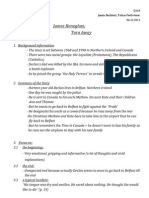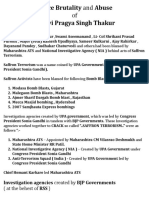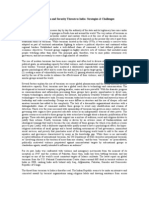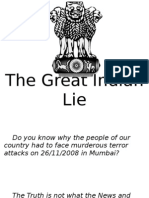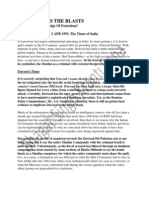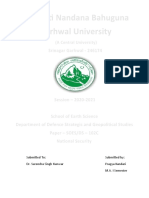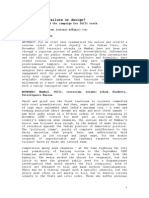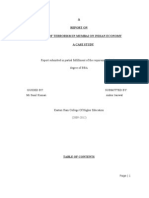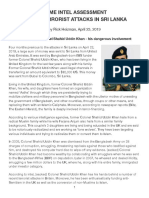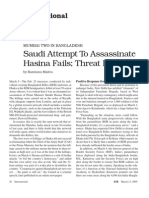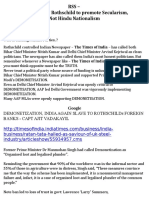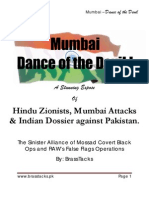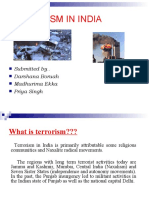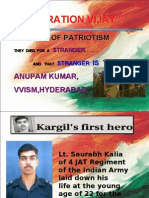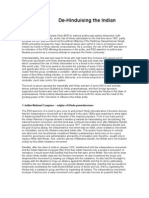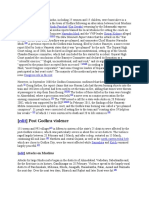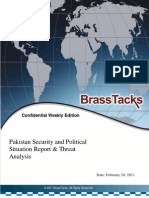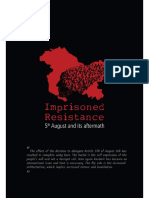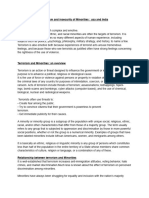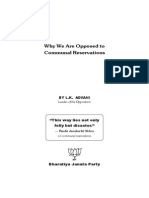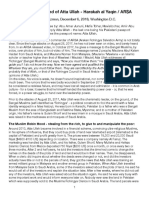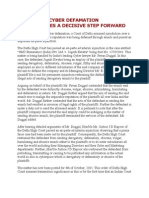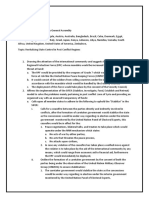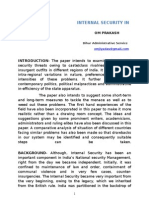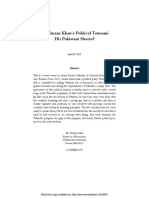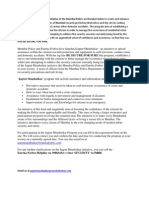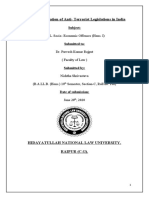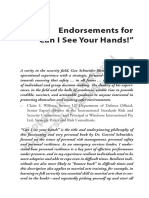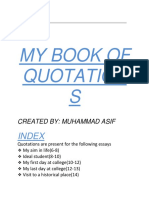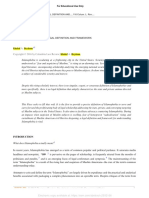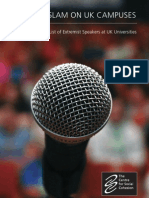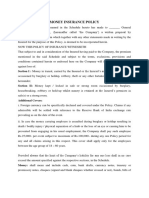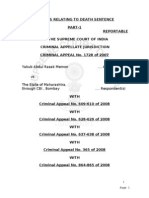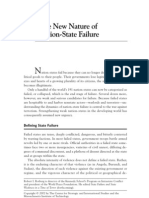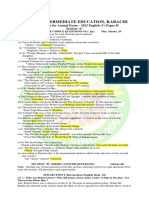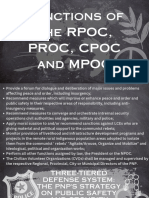In The Reflection of The Mumbai Terror 2013
In The Reflection of The Mumbai Terror 2013
Uploaded by
Phil JohnsonCopyright:
Available Formats
In The Reflection of The Mumbai Terror 2013
In The Reflection of The Mumbai Terror 2013
Uploaded by
Phil JohnsonOriginal Title
Copyright
Available Formats
Share this document
Did you find this document useful?
Is this content inappropriate?
Copyright:
Available Formats
In The Reflection of The Mumbai Terror 2013
In The Reflection of The Mumbai Terror 2013
Uploaded by
Phil JohnsonCopyright:
Available Formats
India: In the Reflection of the Mumbai Terror Attacks
Four Years After Mumbais 9/11, Are Things Safer?
Phil Johnson, Ph.D. From Mumbai, India April 28, 2013 (All pictures courtesy of Global Next)
In November of 2012, Mohammed Ajmal Amir Kasab was executed by the India government for his part in the November 26, 2008 terror attacks in Mumbai, India. Kasab was the only terrorist that was captured alive in the aftermath of that event. The attack involved ten armed men from the Pakistani group Lashkar-e-Taiba who arrived in Mumbai near the Gateway of India, divided into groups of two and began their sixty hours of terror throughout the city. The attackers focused on numerous locations including the Leopold Cafe (a popular spot for tourists), two luxury hotels (the Taj Palace Hotel and the Oberoi/Trident), an Orthodox Jewish center (Chabad House), a hospital for women and children and the CST Train Station. In the end, at least 166 people were dead, nearly 300 were wounded and the world was reminded once again, that safety is an illusion. Its been five months since Kasab was hanged for his crimes. Its been more than four years since the attack itself. So I sat down in Mumbai with Sameer Patil, fellow for national security studies at the Gateway House: Indian Council on Global Relations, to discussed how India is coping in the reflection of what many call Indias 9/11.
The location where the terrorists came ashore in Mumbai, near the Gateway of India
Whats different regarding Indias security now compared with four and half years ago? Because the terrorists approached from the sea, India has strengthened its maritime defense and police presence in all costal areas. In addition, the NIA (National Investigation Agency) was created directly after the Mumbai attacks. They are tasked with all things related to terrorism, Indian insurgents, counterfeit money being pumped into the country by Indias neighbors, Hindu radicalism and other security concerns. One of the targets of the terrorists was the Chabad House, a Jewish Center in Mumbai. Six people were killed there, including the Rabbi and his wife who ran the center. How has this affected the Jewish community? The Mumbai attacks as such did not impact the Jewish community
Armored police vehicle near the Gateway to India Monument: Mumbai, India
except for the fact that it has brought the Lashkar on the Israeli agencies radar for possible threats which target Israeli nationals and Jewish locations in India and elsewhere. This has led to increased security at some places like Chabad Houses, but not all. The attacks did not significantly reduce the number of Israeli tourists who come to India, and in fact some of them have been to the Kashmir region also, which in recent years has seen relative tranquility. The Jewish people have mingled very well with the local Indians here, some of them have picked up local customs and traditions too creating a more cosmopolitan atmosphere. Did the 2012 execution of captured terrorist Mohammed Ajmal Kasab provided closure for India?
His execution provided some closure for citizens, but not closure for the government. For the Indian government, there is still the problem that those who organized this terrorist attack, the leaders of Lashkar-e-Taiba, have not been brought to justice.
Chabad House Rebuilding is underway
Why do you believe that those who orchestrated the attack on Mumbai have not been brought to justice or pursued by Pakistani law enforcement? Lashkar-e-Taiba, as an organization, is deeply embedded into Pakistani society. It is an institution. After they were designated a terrorist organization, they simply changed the organizations name to Jamaat Ud Dawa. This complete integration into society makes it harder to arrest the leaders. Those that have been identified as the planners of the terrorist attack, Abu Qahafa, Sayed Zabiuddin (also known as Abu Jundal) and Sajeed Mir, are all still free. These terrorists continue to work in the open.
Leopold Cafe Early site of gunfire and explosions during terror attack.
Hafiz Saeed, the founder and spiritual leader of Lashkar-e-Taiba, personally indoctrinated the Mumbai attackers. He still openly makes anti-Indian speeches all over Pakistan. He now leads a group called DPC (Defense of Pakistan). Their agenda is very clear and simple. the DPC wants the following: 1. They want the US out of Afghanistan. 2. They want to bring the Taliban back. 3. They want to end the US-Pakistani alliance. 4. They want to rid the Indian subcontinent of Indias influence.
No organization, even one as deeply imbedded as Lashkar-e-Taiba, can be successful unless they can sell their philosophy and recruit agents to carry out their plans. From where is Lashkar-e-Taiba getting their recruits? Many people believe that terrorists are harvested from those who are poor, disenfranchised and who have no hope of a future. But according to a recent study released by the Combating Terrorism Center at the U.S. Military Academy in West Point, this is not true. Terrorists are being recruited from the best and brightest of Pakistans society. Indeed, the report (which is based on materials that the group produces about itself) states that recruits for Lashkar-e-Taiba are well-educated, and include, relatives of a politician, a senior Amy officer and a director of Pakistans Atomic Energy Commission. Those who are recruited, the report says, join with the help of their families who view participation in Lashkar as nationalism or a sort of social service. (April 4, 2013, Ghosh, Jamal, Fair, Rassler and Shoeb. The Fighters of Lashkar-e-Taiba. Combating Terrorism Center Report.)
Taj Mahal Palace Hotel At least 31 people were killed here during the attacks
Conclusion The one thing that India seems to realize is that evil and danger do exist in this world. Governments not only give tacit approval, but sometimes are actively involved in the planning of these events. According to The Atlantic, The Inter-Services Intelligence Directorate (ISI) continues to protect the masterminds, according to Western and Indian counter-terror officials. (April 4, 2013 The Atlantic.) The one thing I didnt find when discussing the attacks in India, was bitterness and hatred. There was a certain academic detachment. Everyone knows theres a problem. Everyone knows that security needs to be increased and strategies must be developed to protect India and her citizens. Some are actively working on Indias global relationships. But there was no hate. Indians dont seem to be interested in advancing hatred towards Pakistanis or any other group. Thats a positive sign, because hatred is always at the core of what creates radicalism and motivates terrorism. Hatred binds people together and is mistaken for nationalism. And hatred makes the world unsafe. As David Bedein, journalist and founder of the Israel Resource News Agency, recently told me when he and I sat down in Jerusalem, when groups teach and tolerate hate, it produces hate education. And hate education eventually becomes war education. In the end, innocent people pay the price. Sameer Omar, said it well. Sameer is a local guide who lives in the Mumbai slums, and was an eye-witness to the attacks of November 2008. He was just 18 years old at the time and was standing at the Gateway of India, just across from the Taj Palace Hotel, one of the sites of the attacks. He recalls hearing the gunfire and the police shouting for people to run. He says, No one knew what was happening or why. And I just ran. Since then, everything is different. Nothing is safe.
Phil Johnson President and founder of Global Next Research Group and Leadership Institute www.globalnext.org www.globalnextegypt.org
You might also like
- James Heneghan Torn AwayDocument1 pageJames Heneghan Torn Awaytobias_pertlwieserNo ratings yet
- Book Analysis - Who Killed Karkare The Real Face of Terrorism in IndiaDocument13 pagesBook Analysis - Who Killed Karkare The Real Face of Terrorism in IndiaNaushad AhmadNo ratings yet
- Power, Politics, and Society: An Introduction To Political SociologyDocument401 pagesPower, Politics, and Society: An Introduction To Political SociologyRadu100% (1)
- Police Brutality and Abuse of Sadhvi Pragya Singh ThakurDocument13 pagesPolice Brutality and Abuse of Sadhvi Pragya Singh Thakurhindu.nationNo ratings yet
- Terrorism and Security Threats To IndiaDocument15 pagesTerrorism and Security Threats To IndiaSuddhasattwa BandyopadhyayNo ratings yet
- The Great Indian LieDocument22 pagesThe Great Indian Lieanon_566887No ratings yet
- @SardesaiRajdeep Article On Dawood After 93 Bomb BlastsDocument3 pages@SardesaiRajdeep Article On Dawood After 93 Bomb BlastsTajinder Pal Singh Bagga75% (8)
- The Red Book and Terrorism in PakistanDocument3 pagesThe Red Book and Terrorism in PakistanASHFAQ REHMANINo ratings yet
- Shia Power Comes of Age: The Transformation of Islamist Politics in Iraq, 2003-2023From EverandShia Power Comes of Age: The Transformation of Islamist Politics in Iraq, 2003-2023No ratings yet
- David Headley Confession On Mumbai MassacreDocument57 pagesDavid Headley Confession On Mumbai MassacreDebabrata MohantyNo ratings yet
- Terrorism in IndiaDocument39 pagesTerrorism in IndiaNexusNo ratings yet
- ISI and Its Strategy For IndiaDocument17 pagesISI and Its Strategy For IndiaPragya KandariNo ratings yet
- Who Is Ad-Dajjal? Is He A Reality or A Myth?Document88 pagesWho Is Ad-Dajjal? Is He A Reality or A Myth?Books and BookletsNo ratings yet
- Intelligence Failure or Design? Karkare, Kamte and The Campaign For 26/11 TruthDocument27 pagesIntelligence Failure or Design? Karkare, Kamte and The Campaign For 26/11 TruthSukumar MuralidharanNo ratings yet
- Three Taliban Linked Myanmar Muslims ArrestedDocument5 pagesThree Taliban Linked Myanmar Muslims ArrestedRick Heizman100% (1)
- Here's The Smoking Gun. So How Come The SIT Is Looking The Other Way?Document10 pagesHere's The Smoking Gun. So How Come The SIT Is Looking The Other Way?t.prasad.saiNo ratings yet
- BJP Gujarat Booklet 1Document23 pagesBJP Gujarat Booklet 1KamalDeep SidhuNo ratings yet
- More Evidence in Proof of Murder Committed by Nandikadal Kamal Gunaratne When He Was DepDocument5 pagesMore Evidence in Proof of Murder Committed by Nandikadal Kamal Gunaratne When He Was DepThavam RatnaNo ratings yet
- Report On 26/11 AttackDocument24 pagesReport On 26/11 AttackRenukaaaNo ratings yet
- KERALA's Radical TurnDocument7 pagesKERALA's Radical TurnArun Mathew100% (1)
- GIA - Khela in Bengal 2021: Shocking Ground StoriesDocument128 pagesGIA - Khela in Bengal 2021: Shocking Ground Storiesh1nd00tv4100% (1)
- Impact of Terrorism in Mumbai On Indian EconomyDocument34 pagesImpact of Terrorism in Mumbai On Indian EconomyAnisha Jaiswal100% (4)
- Sri Lanka Attacks - IntelDocument4 pagesSri Lanka Attacks - IntelRick HeizmanNo ratings yet
- VIF Annual Report 2011Document40 pagesVIF Annual Report 2011Vivekananda International FoundationNo ratings yet
- India's Forgotten SpyDocument2 pagesIndia's Forgotten SpyCanary Trap100% (2)
- Saudi Attempt To Assassinate HasinaDocument4 pagesSaudi Attempt To Assassinate HasinaARFoundationNo ratings yet
- Amit Shah SC (Tulsi Prajapati) Separate FIR CaseDocument61 pagesAmit Shah SC (Tulsi Prajapati) Separate FIR Casekartikeyatanna100% (2)
- Espionage, Espionage Related Crimes, and Immigration: A Risk Analysis, 1990-2019Document44 pagesEspionage, Espionage Related Crimes, and Immigration: A Risk Analysis, 1990-2019Cato InstituteNo ratings yet
- Presented By: Sugam Chaurasia CSJMA16001390292Document9 pagesPresented By: Sugam Chaurasia CSJMA16001390292vinodNo ratings yet
- RSS - Was Set Up To Promote SecularismDocument19 pagesRSS - Was Set Up To Promote Secularismhindu.nation100% (2)
- Frontline March 2012Document136 pagesFrontline March 2012Praveen KumarNo ratings yet
- R B Sreekumar's Letter To CM Narendra Modi 06-01-14Document10 pagesR B Sreekumar's Letter To CM Narendra Modi 06-01-14Sanjiv BhattNo ratings yet
- WadwaDocument154 pagesWadwaDinesh VishnoiNo ratings yet
- Hindu Nationalist Exposes RSS, VHP & SANGH PARIVARDocument17 pagesHindu Nationalist Exposes RSS, VHP & SANGH PARIVARhindu.nation100% (1)
- Introgation Report of David Colman HeadleyDocument34 pagesIntrogation Report of David Colman HeadleyVivek AgrawalNo ratings yet
- Mumbai Attacks-The Real Story - Who Was Behind Mumbai Attack - Eye Opening Facts About Mumbai AttacksDocument90 pagesMumbai Attacks-The Real Story - Who Was Behind Mumbai Attack - Eye Opening Facts About Mumbai Attacksraza2u73% (11)
- Terrorism in India: Submitted By.. Darshana Boruah Madhurima Ekka Priya SinghDocument21 pagesTerrorism in India: Submitted By.. Darshana Boruah Madhurima Ekka Priya SinghEkta PaliwalNo ratings yet
- Kargil War and 1st HeroDocument18 pagesKargil War and 1st Heroabeanupam100% (3)
- SIMI Fictions TehelkaDocument68 pagesSIMI Fictions TehelkaMuhammedAfzalPNo ratings yet
- De-Hinduising The Indian NationDocument20 pagesDe-Hinduising The Indian Nationkingponting100% (1)
- JhulelalDocument10 pagesJhulelalKarachibreezeNo ratings yet
- From Nandikadal To Handi-KadaalDocument10 pagesFrom Nandikadal To Handi-KadaalThavamNo ratings yet
- Judgement in Human-Trafficking Offences Allegedly Commited by Army PersonnelDocument100 pagesJudgement in Human-Trafficking Offences Allegedly Commited by Army PersonnelSampath BulusuNo ratings yet
- Pranab Mukherjee's Advisor Omita Paul ExposedDocument10 pagesPranab Mukherjee's Advisor Omita Paul Exposeddharma next100% (1)
- Is The Dravidian Movement DyingDocument5 pagesIs The Dravidian Movement DyingFriends of Dr. SwamyNo ratings yet
- Post Godhra Violence: Vishva Hindu Parishad Kar Sevaks Narendra Modi Giriraj KishoreDocument10 pagesPost Godhra Violence: Vishva Hindu Parishad Kar Sevaks Narendra Modi Giriraj KishoreAzad SainiNo ratings yet
- Sit Rep February 20 2011Document24 pagesSit Rep February 20 2011Raheel EjazNo ratings yet
- Communal Violence in India PDFDocument2 pagesCommunal Violence in India PDFTrinaNo ratings yet
- Dhananjay Keer - Life of Swatantryaveer V. D. SavarkarDocument58 pagesDhananjay Keer - Life of Swatantryaveer V. D. SavarkarScribd Giveaway100% (2)
- Birth of Women DacoitDocument156 pagesBirth of Women Dacoitmailto_prasad6023No ratings yet
- Kashmir Report Lawyers and Activists Final CompressedDocument162 pagesKashmir Report Lawyers and Activists Final CompressedAltaf Hussain Wani100% (1)
- Justice J.L. Kapur Commission Report On Gandhi Assassination PART2 ADocument51 pagesJustice J.L. Kapur Commission Report On Gandhi Assassination PART2 ASampath BulusuNo ratings yet
- Terrorism and Insecurity of Minorities in USA and IndiaDocument12 pagesTerrorism and Insecurity of Minorities in USA and IndiaMOHIT RALLYNo ratings yet
- Golden Wedge 1Document16 pagesGolden Wedge 1Md KabirNo ratings yet
- Truth of GujaratDocument8 pagesTruth of GujaratShades HussieNo ratings yet
- Jawhar Lal Nehru On ReservationDocument12 pagesJawhar Lal Nehru On ReservationkasturishivaNo ratings yet
- Some Background of Atta Ullah - Harakah Al Yaqin / ARSADocument4 pagesSome Background of Atta Ullah - Harakah Al Yaqin / ARSARick Heizman100% (1)
- The Prism of CrimeDocument20 pagesThe Prism of CrimeYining Zhou (Susie)No ratings yet
- The Cloud Caliphate Archiving The IslamiDocument30 pagesThe Cloud Caliphate Archiving The IslamiKhaled ShakerNo ratings yet
- Cyber DefamationDocument22 pagesCyber DefamationnightwhispererNo ratings yet
- Specpol WP 1.1Document5 pagesSpecpol WP 1.1smaniya5707No ratings yet
- Religion in Global Conflict Final SlidesDocument18 pagesReligion in Global Conflict Final SlidesRhovic SalmoyNo ratings yet
- Negotiating Muslim Youth Identity in A Post 911 WorldDocument17 pagesNegotiating Muslim Youth Identity in A Post 911 WorldEllita Permata AnwarNo ratings yet
- INTERNAL SECURITY (Changing Scenario & Needed ReformsDocument58 pagesINTERNAL SECURITY (Changing Scenario & Needed ReformsOm Prakash Yadav100% (2)
- CIA Terrorist Animals' Severe Anti-Human Mental DisorderDocument12 pagesCIA Terrorist Animals' Severe Anti-Human Mental DisorderHaroutyun Karabajakyan100% (1)
- Has Imran Khan's Political Tsunami Hit Pakistani Shores?: April 22, 2012Document22 pagesHas Imran Khan's Political Tsunami Hit Pakistani Shores?: April 22, 2012Bella SawanNo ratings yet
- Jagrut MumDocument18 pagesJagrut MumseemarainaNo ratings yet
- David Hughes - Omniwar PresentationDocument63 pagesDavid Hughes - Omniwar PresentationRudy Tatang Raja Braimon SidabutarNo ratings yet
- Reaction PaperDocument7 pagesReaction PaperHababa AziwazaNo ratings yet
- Demarest Winning Insurgent WarDocument541 pagesDemarest Winning Insurgent WarAaron Felter100% (1)
- Sem. - X, Nishtha Shrivastava, Cr. L Socio Economic Offences Hons. I ProjectDocument19 pagesSem. - X, Nishtha Shrivastava, Cr. L Socio Economic Offences Hons. I ProjectNISHTHA SHRIVASTAVANo ratings yet
- Can I See Your HandsDocument50 pagesCan I See Your HandsAdriana de PaulaNo ratings yet
- What Lawfare MeansDocument41 pagesWhat Lawfare MeansbenoitdespinozaNo ratings yet
- English Essay Quotations For Second Year-2Document149 pagesEnglish Essay Quotations For Second Year-2Tayyba Rizwan100% (2)
- Khaled Beydoun Towards Legal Definition of Islamophobia SSRN-id2933156Document16 pagesKhaled Beydoun Towards Legal Definition of Islamophobia SSRN-id2933156jojoNo ratings yet
- The Changing Character of War Hew Strachan Europaeum Lecture 2006Document44 pagesThe Changing Character of War Hew Strachan Europaeum Lecture 2006ocelotl1975No ratings yet
- Douglas Murray - Muslim Student Oppinoin and Extremist On UniversitiesDocument46 pagesDouglas Murray - Muslim Student Oppinoin and Extremist On UniversitiesprowlingNo ratings yet
- Adalah's Review Volume 4 - in The Name of SecurityDocument136 pagesAdalah's Review Volume 4 - in The Name of SecurityAdalah - The Legal Center for Arab Minority Rights in IsraelNo ratings yet
- Money Insurance PolicyDocument8 pagesMoney Insurance PolicyZona ZamfirovaNo ratings yet
- Ch10 Political ViolenceDocument30 pagesCh10 Political ViolenceLucianoDalcolVianaNo ratings yet
- 1993 Bombay Blast Judgment - Yakub Abdul Razak MemonDocument790 pages1993 Bombay Blast Judgment - Yakub Abdul Razak MemonOutlookMagazineNo ratings yet
- ROTBERG - Robert I.the New Nature of Nation-State FailureDocument12 pagesROTBERG - Robert I.the New Nature of Nation-State FailureCamilla RcNo ratings yet
- Board of Intermediate Education, Karachi: Model Paper For Annual Exam - 2023 English (C) Paper-II Section - A'Document9 pagesBoard of Intermediate Education, Karachi: Model Paper For Annual Exam - 2023 English (C) Paper-II Section - A'sergio martini100% (1)
- Muslim Renaissance and ModernityDocument7 pagesMuslim Renaissance and Modernitysuhair1951No ratings yet
- Functions of The Rpoc Proc Cpoc and MpocDocument7 pagesFunctions of The Rpoc Proc Cpoc and MpocRowenaNo ratings yet
